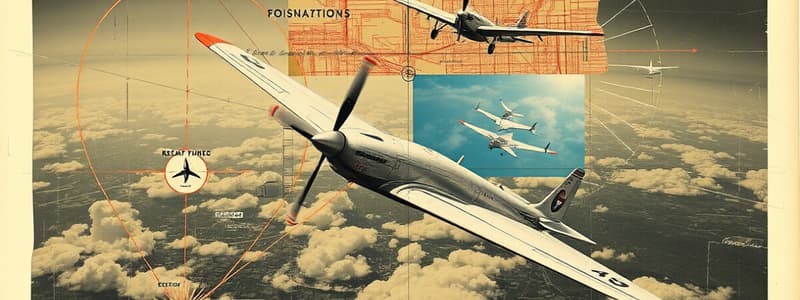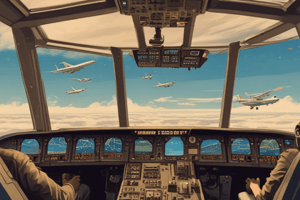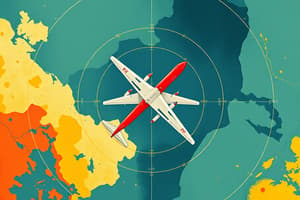Podcast
Questions and Answers
What happens if the aircraft's transponder fails during flight within Class D airspace?
What happens if the aircraft's transponder fails during flight within Class D airspace?
No deviation is required because a transponder is not required in Class D airspace.
When are you required to have an instrument rating for flight in VMC?
When are you required to have an instrument rating for flight in VMC?
Flight into Class A airspace.
What limitation is imposed on a newly certificated commercial airplane pilot if that person does not hold an instrument pilot rating?
What limitation is imposed on a newly certificated commercial airplane pilot if that person does not hold an instrument pilot rating?
The carrying of passengers for hire on cross-country flights is limited to 50 NM and the carrying of passengers for hire at night is prohibited.
How long does a pilot meet the recency of experience requirements for IFR flight after successfully completing an instrument competency check if no further IFR flights are made?
How long does a pilot meet the recency of experience requirements for IFR flight after successfully completing an instrument competency check if no further IFR flights are made?
What is the maximum IFR altitude you may fly in an unpressurized aircraft without providing passengers with supplemental oxygen?
What is the maximum IFR altitude you may fly in an unpressurized aircraft without providing passengers with supplemental oxygen?
What is the oxygen requirement for an unpressurized aircraft at 15,000 feet?
What is the oxygen requirement for an unpressurized aircraft at 15,000 feet?
What occurs if the aircraft's transponder fails during flight within Class B airspace?
What occurs if the aircraft's transponder fails during flight within Class B airspace?
No pilot may act as pilot-in-command of an aircraft under IFR or in weather conditions less than the minimums prescribed for VFR unless that pilot has completed at least how many instrument approaches, holding procedures, and intercepting and tracking courses?
No pilot may act as pilot-in-command of an aircraft under IFR or in weather conditions less than the minimums prescribed for VFR unless that pilot has completed at least how many instrument approaches, holding procedures, and intercepting and tracking courses?
Which limitation is imposed on the holder of a Commercial Pilot Certificate if that person does not hold an instrument rating?
Which limitation is imposed on the holder of a Commercial Pilot Certificate if that person does not hold an instrument rating?
During your preflight planning for an IFR flight, what must you be able to fly to the first airport of intended landing?
During your preflight planning for an IFR flight, what must you be able to fly to the first airport of intended landing?
What are the minimum qualifications for a person who occupies the other control seat as safety pilot during simulated instrument flight?
What are the minimum qualifications for a person who occupies the other control seat as safety pilot during simulated instrument flight?
The pilot in command of a civil aircraft must have an instrument rating only when operating under what conditions?
The pilot in command of a civil aircraft must have an instrument rating only when operating under what conditions?
What rating or ratings do you need to carry passengers for hire on a night VFR flight in a single-engine airplane within a 25-mile radius of the departure airport?
What rating or ratings do you need to carry passengers for hire on a night VFR flight in a single-engine airplane within a 25-mile radius of the departure airport?
If an unpressurized aircraft is operated above 12,500 feet MSL, but not more than 14,000 feet MSL, for a period of 2 hours 20 minutes, how long during that time is the minimum flight crew required to use supplemental oxygen?
If an unpressurized aircraft is operated above 12,500 feet MSL, but not more than 14,000 feet MSL, for a period of 2 hours 20 minutes, how long during that time is the minimum flight crew required to use supplemental oxygen?
To meet the requirements for flight under IFR, what is one of the required instruments?
To meet the requirements for flight under IFR, what is one of the required instruments?
Under what conditions is the use of certain portable electronic devices prohibited on aircraft that are being operated under?
Under what conditions is the use of certain portable electronic devices prohibited on aircraft that are being operated under?
To meet the minimum instrument experience requirements, within the last 6 calendar months what is needed?
To meet the minimum instrument experience requirements, within the last 6 calendar months what is needed?
What minimum weather conditions must be forecast for your ETA at an alternate airport that has a precision approach procedure, to list it as an alternate for the IFR flight?
What minimum weather conditions must be forecast for your ETA at an alternate airport that has a precision approach procedure, to list it as an alternate for the IFR flight?
Study Notes
Transponder and Airspace Requirements
- Transponder failure in Class D airspace does not require deviation as a transponder is not mandated in this classification.
- If a transponder fails in Class B airspace, ATC may permit deviation to allow landing at the destination airport.
Instrument Rating Necessities
- An instrument rating is mandatory for flight in Class A airspace under Visual Meteorological Conditions (VMC).
- For night VFR flights carrying passengers, a Commercial Pilot Certificate with single engine and instrument rating is required.
Pilot Limitations
- Newly certificated commercial pilots lacking an instrument rating cannot carry passengers for hire on cross-country flights beyond 50 NM and are prohibited from night operations.
- Pilots with a Commercial Pilot Certificate without an instrument rating face the same limitations regarding passenger carrying on cross-country and night flights.
Recency of Experience and Oxygen Requirements
- For IFR flight, a pilot must complete six instrument approaches and associated procedures within the previous six calendar months for currency.
- Unpressurized aircraft must provide supplemental oxygen to crew above 14,000 feet; passengers require supplemental oxygen above 15,000 feet.
- If operating an unpressurized aircraft between 12,500 and 14,000 feet for extended durations, the crew must use supplemental oxygen for a minimum duration calculated based on time at altitude.
Flight Planning and Fuel Requirements
- If the first intended landing airport lacks an instrument approach and the weather forecast is 3000 feet scattered with 5 miles visibility, fuel must support travel to an alternate airport plus an additional 45 minutes of cruising.
Minimum Instrument Equipment and Prohibition of Devices
- A clock with a sweep second pointer or a digital presentation is required for an aircraft’s IFR operation.
- Use of certain portable electronic devices is prohibited during IFR operations to ensure safety.
Alternate Airport Weather Minimums
- To list an alternate airport for IFR flights with standard alternate minimums, forecasted weather must show a ceiling of at least 600 feet and visibility of 2 statute miles at the estimated time of arrival (ETA).
Studying That Suits You
Use AI to generate personalized quizzes and flashcards to suit your learning preferences.
Description
This quiz covers the essential regulations and requirements for pilots regarding transponders, airspace classifications, and instrument ratings. It delves into specific limitations for commercial pilots and the conditions under which deviations may be allowed. Test your knowledge of critical aviation standards essential for flight safety.




